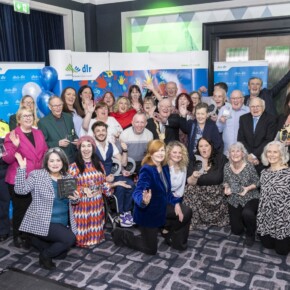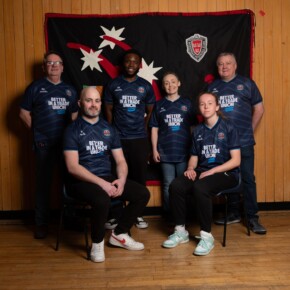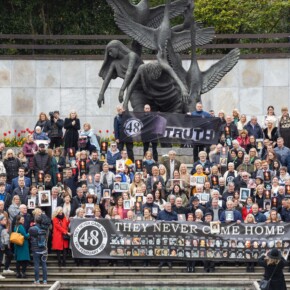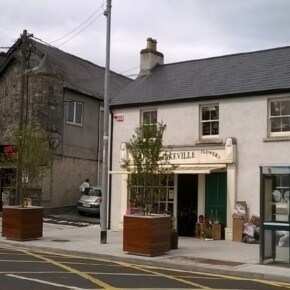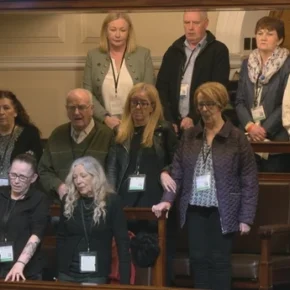Minister For Children meets with survivor of child abuse known as ‘Alice’
Padraig Conlon 25 Jul 2022
The Minister for Children and Equality, Roderic O’Gorman, today held a meeting with ‘Alice’, a survivor of severe abuse while she was a child in foster care in this country, and the subject of an Internal Case Review produced by Tusla in 2020 known as the ‘Alice Report’.
Present at the meeting was ‘Alice’, Alice’s partner, Kate Gillen from the Department, Minister O’Gorman, and the Aontú spokesperson on Children and Equality, Luke Silke.
The meeting was held in the Department of Children building on Baggot Street, and lasted approximately 1.5 hours.
At the meeting Alice requested a State apology for herself and her family, and the establishment of a Commission of Investigation into child abuse which occurred within the State foster care system.
She was glad of the opportunity to meet the Minister and presented him with a typed letter outlining her experiences in State care, and in her subsequent campaign for justice since then.
Alice has asked that a copy of the letter (printed below) she handed the Minister, be shared with the media and with TDs and Senators in the Oireachtas.
25th July 2022
Dear Minister O’Gorman,
My name is ……….. I was born on ……….. 1975. I am known as ‘Alice’ in Tusla’s 2020 Internal Case Review. I want to first of all thank you for meeting with me today – it means a lot to me and my family. I am frustrated that despite multiple attempts to contact your office and Department that myself and my sister were forced to go public with our story via RTE’s Morning Ireland earlier this month in order to get the government’s attention. https://www.rte.ie/news/2022/0710/1309449-foster-care/. It is a very difficult thing for someone to go public with their story and it is most unfortunate that survivors of abuse within the foster care system are not getting answers or justice through the more private avenues and mechanisms available to us and are instead being left with no option but to speak publicly.
I’ve previously spoken to officials in your department over the phone and have had multiple correspondences with your office via email. The reference for my correspondence is DCDEI-MOGO-00214-2020. On the 27th November 2020 I emailed you directly to request a meeting and notified you of the existence of the Alice Report. I was therefore very confused and disappointed when you said on the floor of the Dáil on 2nd June 2022, in response to a question from Deputy Peadar Tóibín, that you had not heard of my case.
https://www.oireachtas.ie/en/debates/debate/dail/2022-06-02/8/?highlight%5B0%5D=t%C3%83%C2%B3ib%C3%83%C2%ADn&highlight%5B1%5D=tusla&highlight%5B2%5D=tusla#s14.
My story is complicated. When I share my story with people, very often they struggle to believe me because they think it is impossible for someone to be as unlucky as I have been, in my life and in my dealings with the system. However, I don’t think I am the victim of bad luck – I think there may be something more sinister at play here. I will try to explain it here as best I can.
My story involves a data breach where a social worker recorded me against my knowledge and took the tapes from Tusla’s office home with her when she retired. It involves a GSOC investigation, and a social worker involved in my case who is married to a GSOC officer. It involves a Garda (from the same Garda station under investigation by GSOC) falsely telling my local authority by email that I had a conviction record, at a time when I was applying for a council house. I have proof and documentation for every one of these allegations. The Gardaí subsequently apologised to me for this but I’m still waiting on the housing list. The matter was reported on the front page of the Irish Examiner last week.
https://www.irishexaminer.com/news/arid-40919462.html#:~:text=Garda%C3%AD%20wrongly%20told%20a%20local,housing%20assistance%2C%20it%20has%20emerged.
Peadar Tóibín TD’s Parliamentary Assistant – Luke Silke – will be able to furnish you with all documentation to back up everything I am saying in this letter. He may be contacted via email luke.silke@oireachtas.ie.
After Tusla conducted their review of my case I was referred, by my GP, to a mental health facility for treatment. Working in that mental health unit, in my hometown, is the very social worker who had failed to report my allegations to Gardaí nearly two decades ago. I am shocked that she is still employed by the HSE, and I did not think it appropriate to refer me back for supports to an environment where I would have to face the very person who did not act on my abuse disclosures.
As someone who does struggle with my mental health, I found that experience most difficult. Imagine telling a psychiatrist or psychologist that the reason you are upset is because the person drinking tea in the room next door in the unit was the person that wronged you – imagine the fear of being painted as a liar, as someone experiencing hallucinations or as a conspiracy theorist?
To get back to the start – I was born in 1975 and from a very early age I witnessed my mother’s partner sexually assault my mother and my siblings. There was a lot of absenteeism in the home, and we were suffering. I was being horrifically sexually abused also by my mother’s partner.
As noted in the Alice Report, my family first came to the attention of the social work department for Community Care Area …………… in December 1985. The issues of concern at that time were in relation to the deterioration of our mother’s health, financial issues and “dependency on her older children in maintaining the home and caring for their half siblings”. Case records, unearthed by Tusla as part of the review, dating to this period also note the social work department’s concerns for the relationship my older siblings had with our mother’s partner.
We were subsequently taken into care following a house fire and in October 1987 an allegation of sexual abuse was made by my sister against our mother’s partner. The disclosure, the Alice Report says, was “validated in a hospital report dated October 1987”. The author of this hospital report, from a Sexual Assault Treatment Unit in Dublin, concluded that we were “at great risk”, and recommended that we should be met with as part of the validation process. This never happened.
The Tusla review states that the records they examined “provide no evidence to verify that this recommendation was followed through” and that there was no evidence of follow-up with the Gardaí in relation to the perpetrator of the abuse.
In 1987 we were placed in foster care. We were further abused both physically and sexually while in foster care. Our abuse was evident to everyone, and some of us spoke up but we were not listened to.
As part of the review, Tusla discovered an ‘undated letter’ from my birth mother which was written to social workers sometime between 1987 and 1989, in which she stated that myself and my siblings had been “beated on the head” by the foster carers. Again, in relation to these allegations the review team could not find information to “verify if these had been followed up and/ or investigated with Mrs B (birth mother), the foster carers or any of the children identified”.
This discovery by Tusla really shocked and upset myself and my siblings – we now know of a physical document – in which our birth mother reported our abuse to social workers, but we know that absolutely nothing was done about it and we were left in the home enduring abuse, some of my siblings for nearly a decade after that letter was sent. It has broken us to know that the State ignored our mother’s letter back then – and to think of how different our lives might have been if action had been taken on foot of those allegations.
In January of 1989 my mother died after suffering a brain haemorrhage. The review states that “the reviewers did not locate any information on case files to demonstrate how the children were supported with this experience”. I can confirm that we were not supported with this experience – clear attempts were made to deter us from visiting our mother in hospital. When our mother died, we found out about it at Mass in the local church where we were singing in the choir and the priest read out her name as recently deceased.
Throughout 1990 I reported feeling unhappy to my social workers, and the case files noted that I was being treated differently than the foster family’s own children. They also show that the foster mother was complaining to social workers about my behaviour.
Despite these concerns, and my mother’s allegations prior to her death, I continued to reside with the foster family until March 1992. At this point I ran away to live with an older half sibling. I was 16 years of age and I left my placement without the consent of foster carers, the district court or the ………. Health Board. I was never removed from that home – I ran away.
In February 1995 my older sister wrote to the social worker expressing concerns about one of my sisters who was still living in the foster home was being subjected to physical abuse by the foster family and was being questioned by the family “after each social work visit”. It was at this point that additional allegations of physical abuse were made by my younger sister. Another sister and I made further allegations of physical and emotional abuse against the same foster carers at this time also.
It would be two months before my siblings were removed from the foster placement. The Tusla review team could not locate evidence on the case files that the allegations of physical abuse were reported to the Gardaí.
At a case conference in March of 1995 a recommendation was made that all other foster children who were previously placed with the family – a total of sixteen children – should be interviewed by the social work department. However, the review could not verify that such interviews were conducted. Eventually in April 1995, at least six years after my mother made allegations that we were being abused, the social work department confronted the foster parents with the allegations. The abuse was confirmed and the remaining two children in the foster placement were formally removed.
It would, however, be almost a year before a decision would be reached in March 1996 that the foster family in question should no longer be considered or used as approved foster carers.
To think that my mother reported that we were being abused, prior to her death in 1989, and yet the foster family were not struck off until 1996 is horrifying for me. What we experienced in the interim was absolutely shocking and has stayed with me in the years since.
We would go on to talk to social workers and make more disclosures about our abuse right throughout the 1990s and 2000s. Nobody was ever prosecuted for what was done to us – this is despite my sister’s abuser actually confessing to the sexual abuse to Gardaí. He was not prosecuted. None of the people who abused me have ever been prosecuted. To the best of my knowledge none of the social workers or Gardaí who failed to follow up on my disclosures of abuse have ever been disciplined, penalised or dismissed – in fact it seems some of them have actually been promoted.
The reason I am meeting you today, Minister, and the reason I am handing you this letter, is to tell you that I know my case is not a once off failure.
I know other victims of abuse where the trends from my case are all the same. Where victims had to run away from home in order to escape the abuse because their disclosures were not being acted upon. Where other potential victims – siblings of the child making the disclosure were never interviewed as part of the investigation. This is not ancient history – many of the people who allege they were abused in foster care date their abuse to the 1980s, 1990s and 2000s.
We have rightly seen robust investigations into child abuse in other areas – whether it’s the Ryan Report on clerical sexual abuse, or the Mother and Baby Homes Commission of Investigation – but as far as I can see no government or minister has ever set about to examine or quantify the level of physical, emotional and sexual abuse experienced by children in foster care in this country over the years. No government has sought justice for survivors in my position. We have been largely ignored – and in my case I would argue I have actually been actively persecuted by the State. My engagements with the State, in my campaign for justice, have caused me more pain than healing. I would like you to commit to a full scale investigation into child abuse within the fostering system in Ireland.
The reason the Farrelly Commission was set up was because the State discovered that there were forty other children who came through the doors of the foster home in question – and efforts needed to be made to interview them. There are sixteen people who came through the doors of the foster family which abused me. There needs to be a Commission of Investigation the examine the system as a whole – to quantify how many Grace’s and Alice’s there are out there. There are too many stories in the media for us to conclude that abuse within the system was a rare occurrence. Will you commit to looking into this?
I thank you again for listening to me. For listening to my story. I really appreciate it and I wish you well in your portfolio as Minister for Children and Equality.
For your information, I am also furnishing the Minister for State at your Department – Minister Anne Rabbitte – with a copy of this letter – given her knowledge of the care system’s failures in this country and in particular her commentary on the Grace and Brandon cases.
Warm Regards,
“Alice”
…………….
Speaking today, Aontú leader Peadar Tóibín TD, who has previously raised Alice’s case in the Dáil said:
“I am glad that ‘Alice’ today got the opportunity to discuss her concerns and experiences with Minister O’Gorman, I am disappointed that it took nearly three decades of campaigning before the government listened to her story, and invited her to the Minister’s desk.
“Alice’s case bears striking resemblance to the Grace case – everyone knew she was being abused, but nobody did anything. One major unanswered question remaining is whether or not the 16 other children who went through the doors of that foster home, where Alice was abused, were every interviewed by Gardaí or social workers as part of any investigation. This matter is very serious and Aontú will be raising the matter with the government once more, as soon as the Dáil is sitting again”, concluded Deputy Tóibín.
Speaking after the meeting, Luke Silke, Dáil assistant to Deputy Tóibín and Aontú spokesperson for Children and Equality, said:
“Today’s meeting was very emotional, and I want to credit Alice on the enormous amount of investigating and research she has conducted largely by herself, in order to seek justice. Alice’s story is complex, but she did a brilliant job of explaining it to the Minister at the meeting today. At the meeting the Minister verbally apologised for the experience Alice had, not only in State care, but along the path to justice in the decades since. Aontú remain committed to the idea that a full public State apology to Alice and her family, and the establishment of a commission of investigation into the matter would be the most appropriate course of action from here”, concluded Mr Silke.


